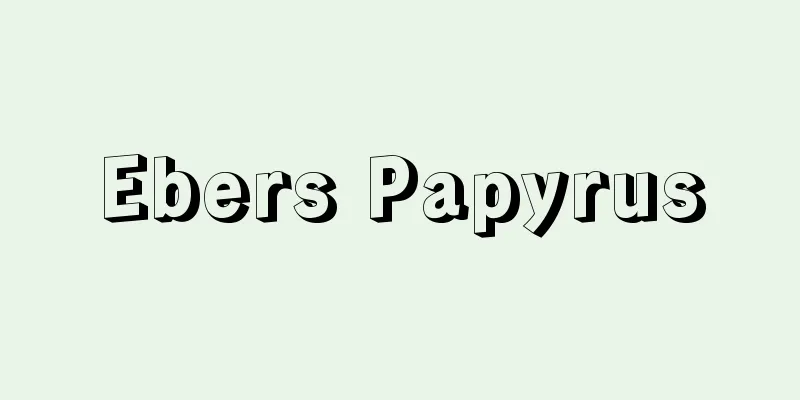Ebers Papyrus

|
…These scientific knowledge were written down on papyrus and kept in temple libraries. Examples include the Rhind Papyrus, which contains examples and solutions for arithmetic and geometry, the Ebers Papyrus, which contains a compilation of symptoms and treatments for illnesses, and the Edwin Smith Papyrus, which contains information on surgical diagnosis and treatment. Because it developed as a practical science, it was limited to the accumulation of knowledge and did not lead to the discovery of laws that connected the facts. … From [Herbal Medicine]… In Egypt, herbal medicines were recorded in hieroglyphics on papyrus. The Ebers Papyrus, written around 1500 B.C., is said to contain 700 kinds of plant, animal, and mineral medicines and 800 prescriptions. Mineral herbal medicines included gemstones, which were powdered for internal use, and multi-flavored medicines made by mixing about 100 kinds of herbal medicines. … From [Poison] ...On the other hand, the term toxicology is thought to be a translation that focuses on the reactions of the living body, and since it has been used mainly in the field of medicine, it is generally interpreted to include content equivalent to what is now called clinical toxicology, such as the causative substances and mechanisms of poisoning, as well as symptoms, diagnosis, treatment, and specific antagonists. *Some of the terminology explanations that mention the Ebers Papyrus are listed below. Source | Heibonsha World Encyclopedia 2nd Edition | Information |
|
…これらの科学的知識はパピルスに記されて神殿の文庫に保管された。算術や幾何学の例題と解答を集めた〈リンド・パピルス〉,病気の症状と治療法を集成した〈エーベルス・パピルス〉,外科手術の診断と治療法の〈エドウィン・スミス・パピルス〉などがある。〈実学〉として発達したため知識の集積にとどまり,事実をつなぐ法則の発見にはいたっていない。… 【生薬】より… エジプトではパピルスに象形文字で生薬が記録された。前1500年ころに書かれた《エーベルス・パピルス》には700種類の植物,動物および鉱物性の薬と800種類の処方があるといわれている。鉱物性生薬の中には宝石類が含まれ,粉にして内用に,また100種類ほどの生薬を混合する多味薬剤があった。… 【毒】より…一方,中毒学という用語は,対象の中心を生体の反応に置いて訳出された言葉と考えられ,主として医学の分野で使われてきた関係から,一般には原因物質や発現機序のほかに中毒の症候,診断,治療および特異的拮抗剤など,今日でいうところの臨床中毒学に相当する内容が含まれていると解釈される。 ※「《エーベルス・パピルス》」について言及している用語解説の一部を掲載しています。 出典|株式会社平凡社世界大百科事典 第2版について | 情報 |
Recommend
Pit organ
...Similar structures are also found in the audit...
Authorized Foreign Exchange Bank (gaikoku kawase kouningin ko)
A bank that engages in foreign exchange transactio...
Junshu - Junshu
A rich, cloudy sake. Also, a pure sake. Source: Ab...
Hamburgische Staatsoper (English spelling)
…The first performance was on August 13, 1876, wi...
Kaifusou - Kaifusou
A collection of Chinese poetry. 1 volume. The aut...
MFPM - Multi-Functional Power Meter
…A holding company for Manufacture Française des ...
Crystal glass - kurisutarugarasu (English spelling) crystal glass
Glass for crafts with high reflectivity, refracti...
Capogrossi, G. (English spelling) CapogrossiG
...The works of Fautrier and Bors during and imme...
Saarstatt
...The amendment of the Saar Agreement on May 20,...
Andaman Islands - Andaman
Located in the southeastern Bay of Bengal, it cons...
Bullock, Sandra
Born July 26, 1964 in Arlington, Virginia. America...
Round-trip postcard - Oufuku postcard
...Japanese postcards are regulated as second-cla...
Vestibule (English spelling)
Architectural term. A portal room in Roman archite...
Agricultural Association - Noukai
One of the major agricultural organizations befor...
Precipitation hardening
When a supersaturated solid solution is aged, it u...









